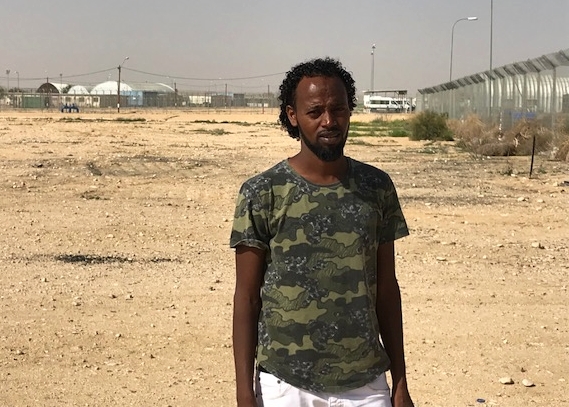The Plight of Eritrean and Sudanese Asylum Seekers in Israel

This Refugees International (RI) report examines the status of Eritrean and Sudanese asylum seekers in Israel, as the government of Prime Minister Benjamin Netanyahu seeks to either remove this population from Israel or place large numbers in indefinite detention. The report examines Israeli government policies that have denied protection to asylum seekers and alarming new proposals that would put this vulnerable population in greater peril.
In February and March 2018, a RI team traveled to Israel to assess the situation for Eritrean and Sudanese asylum seekers, in light of the stated intentions of Israeli officials. RI was particularly concerned about this issue due to the denial of effective access to asylum and serious risks faced by tens of thousands of the Eritrean and Sudanese asylum seekers if they were deported.
“Thousands of Eritreans and Sudanese are seeking refuge in Israel having fled from countries with brutal dictatorships that have perpetrated gross and systematic violations of
human rights.”

Shortly after the RI mission, in a surprising development on April 2, 2018, Israeli Prime Minister Benjamin Netanyahu and other senior Israeli officials announced what the prime minister termed a “landmark agreement” to resolve the status of nearly 35,000 Eritrean and Sudanese asylum seekers currently living in Israel. The agreement, a Framework of Common Understanding with the UN High Commissioner for Refugees (UNHCR), envisioned the departure from Israel over five years of just under half the asylum seekers to third countries under established migration, immigration, and refugee resettlement programs and a regularized status for the others who would remain in Israel.
In defending the arrangement to the Israeli public, the prime minister and other Israeli government officials made a number of reasoned and reasonable arguments: that the Israeli government’s third-country relocation option involving coerced removal to Rwanda and Uganda was not workable; that a large number of African asylum seekers would have inevitably remained in Israel with or without an agreement with UNCHR; and that the agreement and the ability to avoid the prospect of detention for possibly thousands of asylum seekers would free up resources for social and economic development of communities affected by arrivals of asylum seekers.
“I am still not getting the protection I deserve. I applied for asylum a year ago and am still waiting for an interview…I can’t go back. I don’t like not knowing what will happen tomorrow. We are all human.”
sudanese asylum seeker
This was a potentially honorable approach to address the policy challenge resulting from significant migration of asylum seekers from Eritrea and Sudan, countries with brutal dictatorships that have perpetrated gross and systematic violations of human rights. The agreement also would have represented a welcome departure from a policy of the Israeli government designed to drive this population out of Israel without basic safeguards for their fundamental rights.

However, on April 3, 2018, in a stunning reversal, Prime Minister Netanyahu announced he would cancel the agreement. That announcement came after strong expressions of opposition to the agreement among many of the prime minister’s political supporters and allies. Although UNHCR urged the prime minister and the government to reconsider this decision, the agreement remains cancelled as of this writing. In a further twist, the Israeli government announced on April 24 that it would refrain from deporting Sudanese and Eritrean asylum seekers to third countries.
The announcement came in response to a petition filed with Israel’s High Court by human rights groups to block the government from carrying out a plan to deport these asylum seekers. However, Refugees International remains deeply concerned by reports that Prime Minister Netanyahu now intends to reopen the Holot detention center and that the prime minister’s coalition will put forward new legislation designed to effect deportation or any coerced relocation.